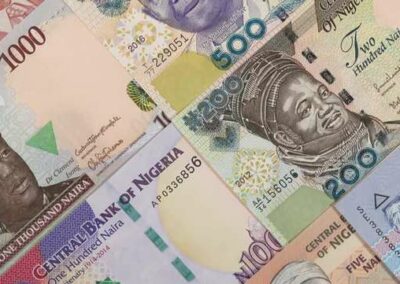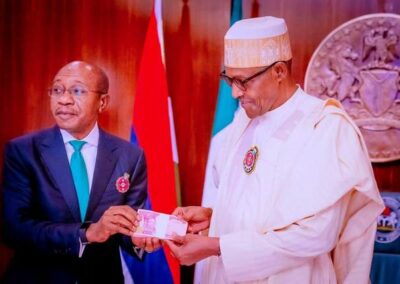On Tuesday, hundreds of residents in Abeokuta, the Ogun State Capital in Nigeria, were on the streets. The peaceful demonstration soon turned into a riot leading to the vandalisation of Banks and ATMs. At the same time in Benin, South-South Nigeria, protesters blocked the road leading to the Central Bank branch in the city. On Monday, several other demonstrators took over the Oyo State Capital, Ibadan, forcing the State governor, Seyi Makinde, to temporarily suspend his political campaigns until calm returns.
What is happening in Nigeria, and why are citizens angry with its financial institutions and the Central Bank? The vast majority of people in Africa’s most populous country are searching for cash to do their businesses and buy food for their families. But not even the banks have the monies to give to them. Even some of the most popular banks have shut down some branches because they can not offer what the people require. The recent decision to redesign the country’s currency has caused a scarcity of cash. Since most Nigerians depend on cash for daily transactions, the scarcity has left many with no option but to storm banking halls to withdraw their savings. And when there is no cash to take from the bank, their frustration results in street demonstrations, and a few violent riots.
The decision that changed the lives of millions
On October 26, 2022, the Central Bank of Nigeria announced the redesign of the country’s currency. Godwin Emefiele, the governor of the Bank, said the ₦200, ₦500, and ₦1,000 notes would be redesigned, and the old notes would cease to be legal tenders beginning from February 1, 2023, a date later extended to February 10, 2023.
The Central Bank said the currency redesign was long overdue and it was necessary to ease the country’s inflation rate.
“The global standard period for redesigning a country’s currency is five to eight years, which means the Naira is long overdue for redesigning, the CBN stated last year. “Also having a considerable amount of money currently outside the banks back into the financial system may help ease inflationary pressures, deepen financial inclusion and enhance cashless policy.”
The decision got the backing of the President, Muhammadu Buhari, and most citizens were unbothered by it because they believed the new currency would be available when needed. Unfortunately, as the deadline of January 31st draws close, the new monies were still unavailable to the people. But for fear that the old notes would become invalid on that date, most citizens deposited all their cash savings. Unfortunately, they were left with no cash as the Central Bank and Commercial banks failed to fulfil their obligation to make the new legal tender available to the people.
While ordinary citizens are protesting the government’s decision, wealthy politicians, governors, and the Supreme court also seem to be against the policy.
The Central Bank, Presidency, Legislature, and Judiciary are not on the same page
While the President and the Central Bank governor have been working hand-in-hand to ensure the success of the currency redesign policy, the National Assembly, especially the House of Representatives, has kicked outrightly against the policy, describing it as anti-people.
The speaker of the House of Representatives threatened to arrest the CBN governor last month after it he failed to appear before the house to explain the situation and the reasons for cash scarcity.
“The House of Representatives intervened on several occasions. We summoned the CBN governor the first time and again, but he refused to answer because we had many hard questions for him,” Femi Gbajabiamila said last month. “It was until I issued the threat of warrant of arrest before he came, and I would have signed that warrant.”
Like the Legislature, governors of several states, including those of the ruling All Progressive Congress (APC), have condemned the decision to redesign the country’s money and hurriedly withdraw the old notes from circulation. On Wednesday, the Supreme Court ruled that the Federal Government and the Central Bank should not adhere to the deadline of February 10 after a group of governors approached the appellate court to grant the order. However, many people have said the political class are only concerned about the policy because they would need cash to buy votes in the coming election.
A policy to curb vote-buying
In Nigeria, politicians are known for vote-buying. These votes are bought with cash that has been kept for years. President Muhammadu has vowed to conduct an election that is free, fair, and credible.
The recent redesign of the currencies could be a way of making the monies saved by these politicians for vote-buying valueless, hence the calls by wealthy politicians for the president and the Central Bank Governor to rethink the decision.
Nigeria’s presidential election is barely fifteen days away. Money plays an important role in the country’s elections. But this time, the decision to redesign the currency and make it scarce until after the election could change that trajectory.
Why Nigerians can’t do without cash
Nigeria is Africa’s most populous nation with approximately 200 million people. It is Africa’s largest economy, and it is often referred to as the giant of Africa. Despite its importance in the African continent, Nigeria is among the most unbanked countries in the world. About 50 per cent of adults in the country have no bank account. In most local government areas, especially in Northern Nigeria, residents could travel for hours before getting to a bank.
Because of the distance from the Banks, most rural dwellers, especially those without formal education prefer to do all transactions in cash rather than an electronic payment system. For some years now, the government has been doing its best to discourage citizens from carrying cash. But the effect of the various policies is almost not seen in markets, as most people attach much value to the physical currency.
When the seller refuses to receive payment via electronic transfer, the buyer has no choice but to pay in cash.
A cashless economy hindered by poor internet connections
While many have reluctantly accepted the cashless policy being initiated by the government, online payments and e-transactions would not go through unless there is a good internet connection.
According to the 2022 Speedtest Global Index, Nigeria recorded a download speed of 21.54 megabits per second. It ranked number 93 out of 140 countries. Other African countries, like Togo, Mali, Congo and Burkina Faso seem to outperform Nigeria on internist speed. With the slow internet connection, business people always complain of failed transactions. Unfortunately, most of these issues are not resolved immediately, and some are never resolved.
The Nigeria Inter-Bank Settlement System (NIBSS) said on a “typically bad day,” 30,000 transactions can become botched even as bank customers’ accounts are debited, thereby leaving the financial institutions and their clients at loggerheads.
The complicated internet usage in the country is one reason why sellers insist to be paid in cash, as no network would affect that method of payment.
Suffering and dying to get cash
So far, there are fears that riots and multiple demonstrations could begin in the coming days due to the scarcity of cash. Sometimes, citizens spend the entire day in queues outside banks to get the new naira notes. Last week, an aged man died in Delta State inside a banking hall while trying to get cash. On Wednesday, another man collapsed inside a bank while waiting for his turn to get new monies.
Pictures shared on social media shows citizens spending the nights at ATMs so that they could be among the first to withdraw cash in the morning. Others had to pay as much as 30% charges to get cash in black markets. While the Banks accuse the Central Bank of not producing enough money, the Central Bank on the other hand is accusing the banks of hoarding the new currency and only giving them to priority customers.
The World Bank and the IMF have called on the Central Bank to extend the deadline to avert an economic disaster. But we’ll have to wait until January 10 to see if that happens.















0 Comments